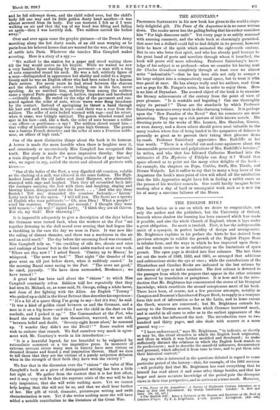THE AUGIISTAN - S.* PROFESSOR SAINTS/IVRY in his new book has given
to the world a singu- larly delightful gift. The Peace of the Auguatana is in no sense written down. The reader never has the galling feeling that his author considers him " For high discourse unfit." Yet every page is so subtly seasoned with amusing comment, and the whole book so charmingly garnished, that none but a dullard could fail to find delight in its perusal, however little he knew of the spirit which animated the eighteenth century. But to one who loves that spirit, and who has already paid homage to the great band of poets and novelists through whom it breathed, the book will prove still more refreshing. Professor Saintsbury's know- ledge of his subject is so profound—when we consider his having read Sir Charles Grandison completely through at least once we almost write " indomitable "—that he has been able not only to comprr his large subject into a comparatively small space, but to treat it _with true gaiete de cceur. He has always really read his authars, read them not as pegs for Mr. Fungus's notes, but in order to enjoy thorn. Here is no hint of Dryasdust. The avowed object of the book is to examine the literary achievements of the century from the point of view of pure pleasure. " Is it readable and beguiling ? Can one thoroughly enjoy its perusal ? " These are the standards by which Professor Saintsbury measures every work in this charming volume. It is perhaps upon the " New Paradise of the Novel " that his comments are most interesting. They open up a rich pasture of little-known novels. '. His directing-posts to the works of Mrs. Lennox, Mrs. Sheridan, Graves, or even Amory, and a dozen others should prove most valuable to the many readers whose fear of being landed in the quagmires of dulness is generally so great as to prevent their taking their pleasure down by-roads. Professor Saintsbury appreciates Mrs. Radcliffe at her true worth. " There is a cheerful cut-and-come-againness about the innumerable persecutions and palpitations of Mrs. Radcliffe's heroines," he writes, and who that has followed Catherine Moreland into the intricacies of The Hysterics of Udolpho can deny it ? Would that space allowed us to point out the many other delights of the book— for example, the chapters on Pope, Crabbe, Swift, Mrs. Thrale, and Horace Walpole. Let it suffice to say that to many a lazy lover of the Augustans the book's mere point of view will afford all the satisfaction that the Idle Apprentice might have felt in finding a rabbit snare on the person of his worthier comrade. One could hardly imagine better reading after a day of hard or uncongenial work such as is now the lot of many a one-time follower of the Muses.


























 Previous page
Previous page